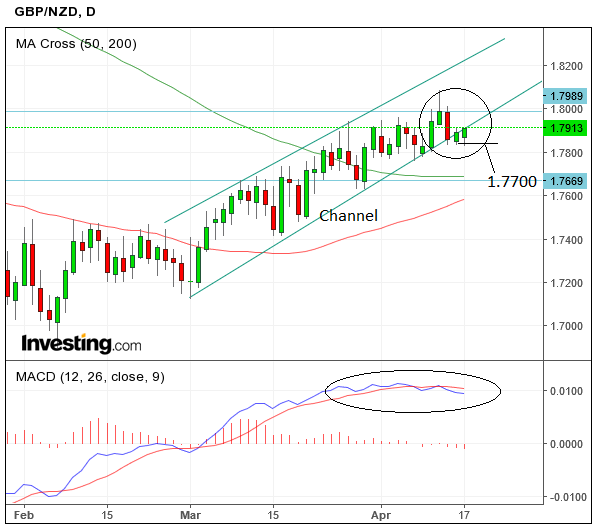New Zealand Dollar Tipped to Hold the Advantage over Sterling Near-Term

The Pound to New Zealand Dollar exchange rate is at 1.7935 as the new trading week begins in earnest with traders returning to their desks following an elongated Easter weekend.
Our technical studies of the exchange rate do however hint at potential weakness ahead.
GBP/NZD has been moving higher in a strong ascending channel ever since the February lows and the overall NZD complex continues to consolidate after a significant fall in early March.
However, over the last few days Sterling has weakened against the Kiwi and now looks like it is either about to break - or has already broken out of the channel and lower.

If the latter is the case, then the move down following the breakout should be the same height as the channel, extrapolated lower from the point of the break.
This gives a downside target of about 1.7700 which is just above a tough stratum of support at 1.7670, which would be likely to limit downside anyway.
The MACD momentum indicator in the bottom panel of the chart is also bearish after crossing over its signal line, and because it is tracing a descending bow-shaped curve.
Data Ahead for the New Zealand Dollar
Strong data from China, which showed a resurgence of the trade surpluses, has helped support both the New Zealand Dollar and the Aussie Dollar too.
In the coming week we get an update on global dairy prices on Tuesday April 18 at 15:05 B.S.T.
Recall dairy exports remain a key component in New Zealand's trade basket and an improvement on the previous 1.6% growth will likely be supportive of NZD.
However, the main hard data release for the Kiwi will be inflation data for the first quarter which is due out at 23:45 B.S.T on Wednesday.
The market expected a 0.8% growth rate in Q1 compared to Q4 2016 and a 2.0% increase in growth over the previous year.
Analysts at TD Securities put Q1 growth mainly down to volatile food and fuel rises, which central banks often ‘look through’ when setting interest rates.
This may mean the Reserve Bank of New Zealand (RBNZ) may be in no hurry to increase rates if inflation is higher, or as high as expected which is unlikely to assist any NZD strength.
“We expect food to rise +2.2% q/q and fuel rose +5.2% q/q hence the Q1 CPI pop is all about food and fuel, two components usually excluded when central banks assess underlying inflation trends (ex-food and fuel is +0.2%). Nevertheless, Q1 CPI rising to 2.0% y/y means RBNZ Governor Wheeler has finally met his 2% mid-point inflation target and can retire in September having finally achieved his KPI. Market range +0.4% to +1.0%, while many look for +0.9% q/q,” says TD Securities in a note to clients.
Remember to keep an eye on Donald Trump and his increasingly internationalist agenda.
The New Zealand Dollar is highly sensitive to market sentiment and the NZD usually falls when markets run scared.
"Rising geopolitical risk is undoubtedly NZD-negative," says Jason Wong at BNZ in Aukland. "BNZ’s risk appetite measure is now well down from its recent high and this has dragged our short-term fair value estimate down."
Retail Sales Data Dominates the Week for the Pound
The main data release for the Pound this week will be March Retail Sales, on Friday, April 21 at 9.30 GMT.
Expectations are not optimistic about the result due to recent disappointing Retail Sales data from the British Retail Consortium (BRC) overlapping the same period.
Analysts forecast headline sales to fall -0.2% compared to the previous month but to rise by 3.6% from the previous year.
Core retail sales expected to fall -0.3% from February and rise 4.0% year-on-year.
“U.K. retail sales are scheduled for release in the week ahead and while the uptick in wages points to a potential upside surprise, the British Retail Consortium reported weaker spending and after last month’s healthy rise, a pullback is expected. There’s significant resistance for GBP/USD between 1.25 and 1.2630,” says Kathy Lien, managing director of BK Asset Management.
"With analysts expecting a slight contraction in March retail sales. Any positive surprise could enhance GBP-bulls, while a disappointment could bring the BoE doves back to the market," says Ipek Ozkardeskaya at London Capital Group.





